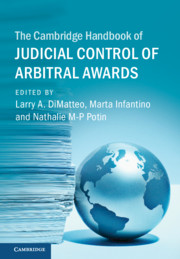Book contents
- The Cambridge Handbook of Judicial Control of Arbitral Awards
- The Cambridge Handbook of Judicial Control of Arbitral Awards
- Copyright page
- Dedication
- Concise Contents
- Contents
- Contributors
- Preface
- Part I Vacating Commercial Arbitration Awards
- 1 Introduction
- 2 Independence and Impartiality of Arbitrators
- 3 Exploring the Parameters of Conflicts of Interest
- 4 Procedural Irregularities and Arbitrator Misconduct during Proceedings
- Part II Enforcing Commercial Arbitration Awards
- Part III Scope and Interpretation of Arbitration Clauses
- Part IV Judicial Control of Arbitral Awards
- Part V Summary and Findings
3 - Exploring the Parameters of Conflicts of Interest
from Part I - Vacating Commercial Arbitration Awards
Published online by Cambridge University Press: 08 October 2020
- The Cambridge Handbook of Judicial Control of Arbitral Awards
- The Cambridge Handbook of Judicial Control of Arbitral Awards
- Copyright page
- Dedication
- Concise Contents
- Contents
- Contributors
- Preface
- Part I Vacating Commercial Arbitration Awards
- 1 Introduction
- 2 Independence and Impartiality of Arbitrators
- 3 Exploring the Parameters of Conflicts of Interest
- 4 Procedural Irregularities and Arbitrator Misconduct during Proceedings
- Part II Enforcing Commercial Arbitration Awards
- Part III Scope and Interpretation of Arbitration Clauses
- Part IV Judicial Control of Arbitral Awards
- Part V Summary and Findings
Summary
As arbitration specialists (arbitrators and practicing lawyers) build their credentials, their paths often cross in scholarship, conferences, and arbitral proceedings. Depending on their relationships with one another, both professional and personal, an appearance of impropriety (conflict of interest) may appear. This appearance is often more an illusion than reality because to the uninitiated the arbitral process seems to be the domain of a secretive group of insiders. In fact, there is a high level of transparency in the selection of arbitrators. Required disclosures flesh out any potential conflict of interest between the arbitrators and the parties. Most arbitrators will voluntarily remove themselves from consideration in order to ensure their professional integrity in the arbitration community. This is especially the case when there are justifiable doubts as to their independence and impartiality. Also, parties may challenge the appointment or retention of an arbitrator in cases of apparent bias.
Keywords
Information
- Type
- Chapter
- Information
- Publisher: Cambridge University PressPrint publication year: 2020
